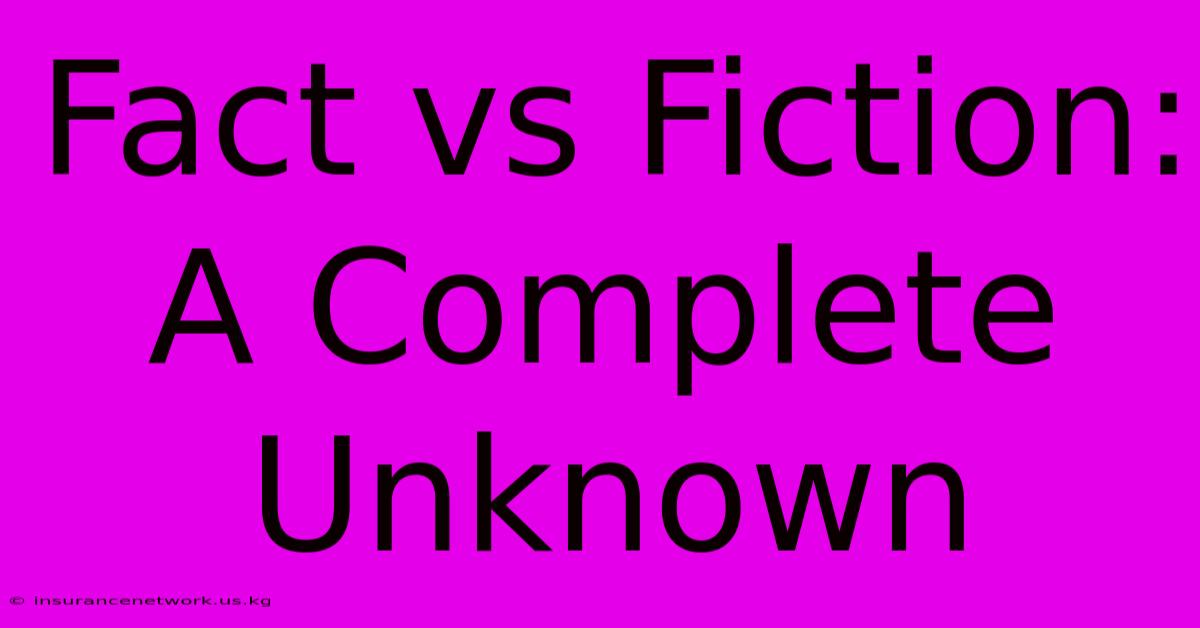Fact Vs Fiction: A Complete Unknown

Discover more detailed and exciting information on our website. Click the link below to start your adventure: Visit Best Website insurancenetwork.us.kg. Don't miss out!
Table of Contents
Fact vs. Fiction: Exploring the Murky Waters of the Unknown
The line between fact and fiction has always been a blurry one, especially when venturing into the realm of the unknown. What we consider "fact" is often shaped by our current understanding, readily available evidence, and the limitations of our perception. The unknown, by its very nature, challenges these limitations, leaving room for both compelling narratives and potentially misleading interpretations. This article delves into the fascinating and sometimes frustrating interplay between verifiable truth and imaginative storytelling within the mysterious areas of life where concrete answers remain elusive.
The Allure of the Unexplained
Humans are inherently curious creatures. We crave understanding, and the absence of explanation often fuels speculation. This is where the unknown thrives. From ancient myths and legends to modern-day mysteries, the unexplained holds an undeniable allure. We are drawn to stories of:
-
Unexplained phenomena: UFO sightings, cryptid encounters, and paranormal activities continuously capture our imaginations, pushing the boundaries of what we consider possible. The sheer lack of definitive answers breeds countless theories and interpretations.
-
Historical enigmas: Lost civilizations, unsolved disappearances, and historical anomalies continue to inspire debate and speculation. The absence of complete information leaves room for countless alternative narratives.
-
Scientific frontiers: The vastness of space, the complexities of the human brain, and the mysteries of the deep ocean all represent areas where our knowledge remains limited. This fuels the creation of both scientific hypotheses and imaginative fiction, often blurring the lines between the two.
Separating Fact from Fiction in the Unknown
Distinguishing between fact and fiction when dealing with the unknown requires a critical and discerning approach. It is essential to:
-
Evaluate the source: Is the information presented coming from a credible and reputable source? Or is it based on hearsay, anecdotal evidence, or outright fabrication?
-
Examine the evidence: What evidence supports the claim? Is the evidence robust and verifiable, or is it circumstantial, subjective, or easily misinterpreted?
-
Consider alternative explanations: Are there other, more plausible explanations for the observed phenomenon? Jumping to extraordinary conclusions without thoroughly exploring alternative possibilities can be misleading.
-
Recognize cognitive biases: Our own biases, preconceptions, and desires can significantly influence our interpretation of ambiguous information. Awareness of these biases is crucial for objective evaluation.
The Power of Narrative in the Unknown
While critical evaluation is essential, it's also important to acknowledge the power of storytelling in exploring the unknown. Fiction, myths, and legends often serve as powerful tools for:
-
Exploring existential questions: Stories of the unknown can delve into fundamental questions about life, death, the universe, and our place within it.
-
Processing fear and uncertainty: By giving shape to the unknown, narratives can help us confront and process our fears and anxieties about the uncertainties of life.
-
Inspiring creativity and innovation: The unknown often fuels creativity and inspires scientific inquiry, prompting us to push the boundaries of our knowledge and understanding.
Navigating the Gray Areas
The challenge lies in navigating the grey areas between fact and fiction, where the boundaries become indistinct. It requires a delicate balance between critical thinking and imaginative exploration. While maintaining a healthy skepticism is crucial, it's equally important to remain open to the possibility that some mysteries may remain unsolved, at least for now. The unknown remains a fascinating frontier, constantly challenging our perceptions and pushing the limits of our understanding. It's a place where fact and fiction intertwine, inspiring wonder, debate, and ongoing exploration. The quest to unravel these mysteries is a continuous journey, one that compels us to question, explore, and ultimately, to better understand ourselves and the world around us.

Thank you for visiting our website wich cover about Fact Vs Fiction: A Complete Unknown. We hope the information provided has been useful to you. Feel free to contact us if you have any questions or need further assistance. See you next time and dont miss to bookmark.
Featured Posts
-
Was Taylor Swift At Chiefs Game Pittsburgh
Dec 26, 2024
-
New Chiefs Record Kelces Receiving Tds
Dec 26, 2024
-
Squid Game Season 2 A Review
Dec 26, 2024
-
Lackluster Nfl Beyonces Halftime Shines
Dec 26, 2024
-
K Pop And Music In Squid Game Season 2
Dec 26, 2024
